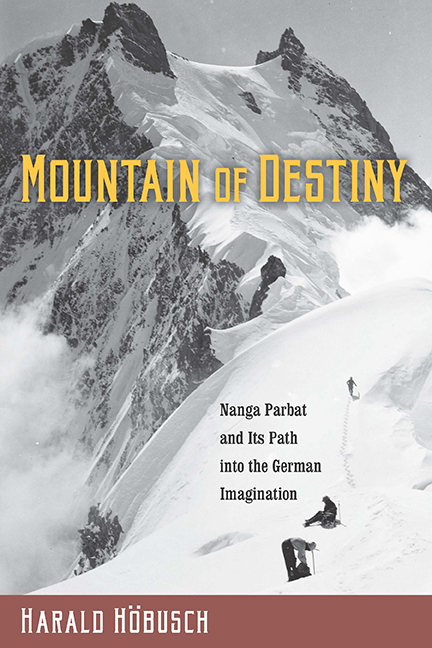Summary
And then it happened; on the upper Diamir Glacier my brother vanished, lost under an avalanche at the very foot of the face…. “Destiny Peak” is one of the names given to Nanga Parbat.
—Reinhold Messner, Solo Nanga Parbat (1980)IN 1953, OF COURSE, THE PATH OF NANGA PARBAT into the German imagination reached only a preliminary end. More than five decades after Hermann Buhl's successful summit climb, the former German “mountain of destiny” once more took center stage in Joseph Vilsmaier's 2010 film Nanga Parbat, a feature that dramatizes the 1970 Sigi-Löw-Gedächtnis- Expedition (Sigi Löw Memorial Expedition), an enterprise remembered today not only for introducing Reinhold Messner, the first superstar of modern alpinism, into the long history of Nanga Parbat mountaineering but also, if not more so, for the tragic death of Messner's younger brother Günther on the descent of the Diamir face after their successful joint ascent of the mountain from the Rupal side. How would Vilsmaier, in this latest filmic account of the German mountaineering history on Nanga Parbat, tell the story of an expedition that, like the 1953 DeutschÖsterreichische Willy-Merkl-Gedächtnis-Expedition, brought together the new and the old guard of Himalaya mountaineering: in this case, Karl Maria Herrligkoffer as expedition organizer and leader (the old) and Reinhold and Günther Messner as two of the lead climbers (the new)? In order to answer this question it will be helpful to revisit the various representations of the German Nanga Parbat expeditions between 1932 and 1953 in print and in film and recall the aspects of narrative continuity/ discontinuity identified in our analysis, as well as to (briefly) explore the literary treatment of two post-1953 German Nanga Parbat expeditions (1970, 1978) by Herrligkoffer and Reinhold Messner, whose books were key in inscribing Nanga Parbat into the German imagination during the second half of the twentieth century.
As regards the representation of German Nanga Parbat mountaineering in print, we were able to observe that, in general terms, the degree of continuity between pre- and post-1945 texts is substantially greater than the degree of discontinuity, an assessment that applies to all genres discussed in this study, be it the official expedition report (Karl Maria Herrligkoffer), the book on mountaineering history (Rudolf Skuhra), the news magazine article (Walter Pause), or the youth book (Herrligkoffer, Hans Thür and Hans Hanke, Thomas Trent, and Arthur Werner).
- Type
- Chapter
- Information
- Mountain of DestinyNanga Parbat and Its Path into the German Imagination, pp. 219 - 226Publisher: Boydell & BrewerPrint publication year: 2016

